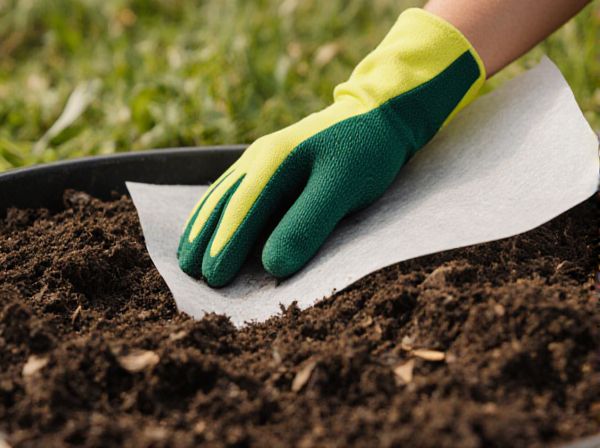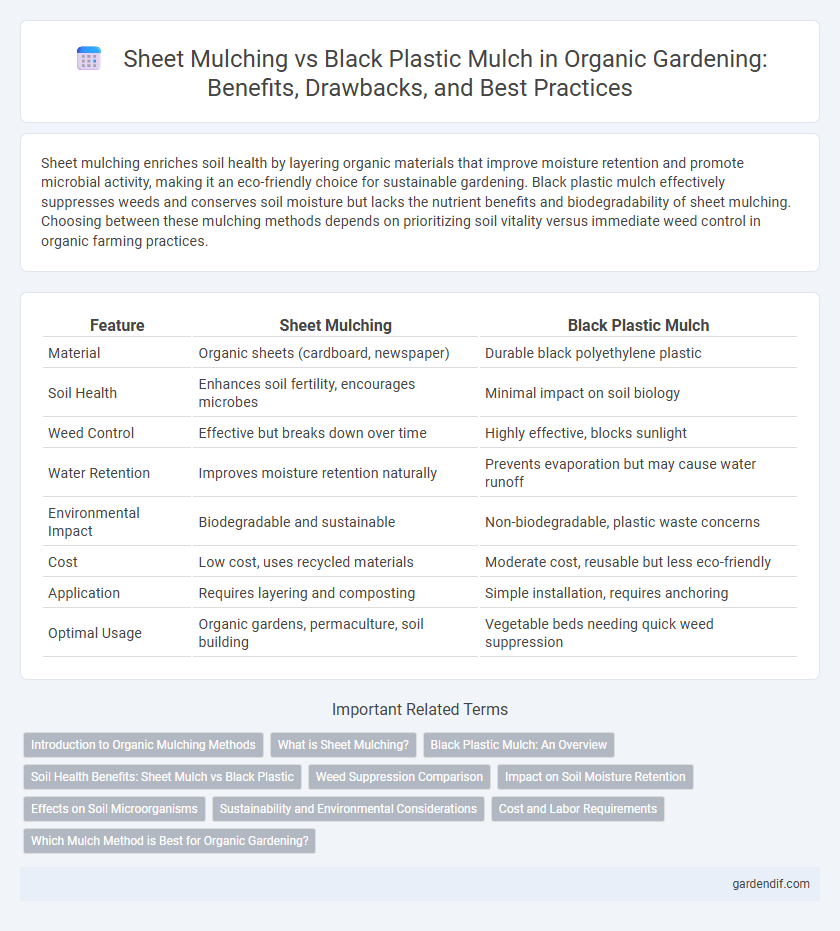
Sheet mulching vs Black plastic mulch Illustration
Sheet mulching enriches soil health by layering organic materials that improve moisture retention and promote microbial activity, making it an eco-friendly choice for sustainable gardening. Black plastic mulch effectively suppresses weeds and conserves soil moisture but lacks the nutrient benefits and biodegradability of sheet mulching. Choosing between these mulching methods depends on prioritizing soil vitality versus immediate weed control in organic farming practices.
Table of Comparison
| Feature | Sheet Mulching | Black Plastic Mulch |
|---|---|---|
| Material | Organic sheets (cardboard, newspaper) | Durable black polyethylene plastic |
| Soil Health | Enhances soil fertility, encourages microbes | Minimal impact on soil biology |
| Weed Control | Effective but breaks down over time | Highly effective, blocks sunlight |
| Water Retention | Improves moisture retention naturally | Prevents evaporation but may cause water runoff |
| Environmental Impact | Biodegradable and sustainable | Non-biodegradable, plastic waste concerns |
| Cost | Low cost, uses recycled materials | Moderate cost, reusable but less eco-friendly |
| Application | Requires layering and composting | Simple installation, requires anchoring |
| Optimal Usage | Organic gardens, permaculture, soil building | Vegetable beds needing quick weed suppression |
Introduction to Organic Mulching Methods
Organic mulching methods such as sheet mulching and black plastic mulch both serve to conserve soil moisture, suppress weeds, and improve soil health. Sheet mulching uses layers of organic materials like cardboard, compost, and straw to create a nutrient-rich barrier that enhances microbial activity and soil fertility. Black plastic mulch offers effective weed control and soil warming but lacks the soil enrichment benefits inherent in organic matter decomposition.
What is Sheet Mulching?
Sheet mulching is an organic gardening technique that involves layering biodegradable materials such as cardboard, newspaper, and compost to suppress weeds and improve soil health. This method enhances moisture retention and promotes beneficial microbial activity, unlike black plastic mulch which can inhibit soil aeration. Sheet mulching supports sustainable gardening by enriching soil fertility naturally without the use of synthetic materials.
Black Plastic Mulch: An Overview
Black plastic mulch offers superior weed control and moisture retention by creating a barrier that reduces evaporation and soil temperature fluctuations. Its durability and ease of installation make it a popular choice in organic farming, promoting healthier root growth and higher crop yields. Compared to sheet mulching, black plastic mulch more effectively suppresses weeds and facilitates earlier planting by warming the soil.
Soil Health Benefits: Sheet Mulch vs Black Plastic
Sheet mulching enhances soil health by improving moisture retention, promoting microbial activity, and adding organic matter as the layers decompose, which boosts nutrient availability and soil structure. In contrast, black plastic mulch primarily conserves soil moisture and controls weeds but lacks the ability to enrich soil biology or contribute organic nutrients. Over time, sheet mulching supports a balanced ecosystem in the soil, fostering long-term fertility and resilience that black plastic mulch cannot provide.
Weed Suppression Comparison
Sheet mulching offers superior weed suppression by creating a thick, biodegradable barrier that smothers weeds and enriches soil organic matter. In contrast, black plastic mulch effectively blocks sunlight to inhibit weed growth but lacks the soil health benefits and can contribute to plastic waste. Organic gardeners often prefer sheet mulching for its dual role in weed control and soil improvement, making it a sustainable alternative to synthetic mulches.
Impact on Soil Moisture Retention
Sheet mulching significantly enhances soil moisture retention by creating a thick, organic barrier that reduces evaporation and improves water infiltration. In contrast, black plastic mulch prevents soil moisture loss by acting as a physical barrier but can lead to reduced water penetration and overheating of the soil. Organic sheet mulching also contributes nutrients as it decomposes, supporting healthier soil moisture dynamics compared to the inert nature of black plastic mulch.
Effects on Soil Microorganisms
Sheet mulching enhances soil microbial activity by introducing organic matter that supports diverse microorganisms, improving soil structure and nutrient cycling. Black plastic mulch reduces microbial diversity and activity due to limited gas exchange and increased soil temperature, which can stress beneficial microbes. Organic practices favor sheet mulching for promoting healthier soil ecosystems and sustainable fertility.
Sustainability and Environmental Considerations
Sheet mulching enhances soil health by promoting organic matter decomposition and moisture retention, reducing the need for chemical fertilizers and irrigation. Black plastic mulch, while effective at weed suppression and soil warming, can contribute to plastic waste and soil microplastic contamination if not properly managed. Prioritizing biodegradable or compostable options in sheet mulching supports long-term sustainability and reduces environmental impact compared to synthetic plastic mulches.
Cost and Labor Requirements
Sheet mulching typically involves organic materials like cardboard and compost, which lower upfront costs but require moderate labor for layering and maintenance. Black plastic mulch demands higher initial investment for purchasing synthetic sheets and involves less frequent upkeep, reducing overall labor time. Choosing between them depends on budget constraints and willingness to invest labor for sustainable soil health benefits.
Which Mulch Method is Best for Organic Gardening?
Sheet mulching enhances soil health by incorporating organic materials that promote microbial activity and improve moisture retention, making it ideal for organic gardening. Black plastic mulch effectively suppresses weeds and warms soil but may hinder soil aeration and lacks the ecological benefits of organic matter integration. Choosing sheet mulching supports sustainable practices by enriching soil structure and fostering a balanced ecosystem essential for organic produce.
Sheet mulching vs Black plastic mulch Infographic

 gardendif.com
gardendif.com